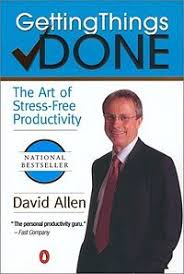On more than one occasion I've said "The size of my email inbox can dictate my mood." Fortunately for the past year my mood has not been dictated by my email inbox very often (other things have but that is for a different blog post ;-). A few colleagues recently mentioned to me that they had a few thousand emails sitting in their inbox. Not surprisingly it was affecting their approach to work so I thought I'd share my email management experience here.

Much of the credit for the progress I've made goes to the
Getting Things Done approach developed by David Allen. (
Audiobook) Given the complexities that come with working with people, which is what we do in student affairs, it is crucial that professionals improve their personal productivity skills, such as managing email. Failure to improve in this area will lead to frustration, such as having the size of your email inbox dictate your mood, and will decrease your chances of gaining more responsibilities in the future.
A key aspect of the GTD approach is "Get in to zero" which means emptying your inbox's regularly. Inbox is plural because GTD encourages you to have a number of places to capture material, paper in your office or home, a mobile inbox to capture your thoughts and ideas on the go etc. For this blog I'll focus on your email inbox. Allen says that keeping material in your inbox will feel like a psychological weight on your brain. For instance in the moments when you have gotten your inbox completely cleared out you've probably felt much better in that moment. With some commitment on your part GTD can help you to sustain that feeling every day.
I won't describe how to get your email under control the first time as David Allen's company has done that
here through a free download. You will need to set aside some time up front to clear out the few hundred (or few thousand!) emails and dedicate time each day on an ongoing basis to keep it working. It is worth it though. Some of the headings from the free download, which will give you a glimpse into the approach, include:
- Use the delete key
- File!
- Complete the less than 2-minute actions
- Organize emails that require action and follow-up
In the book Allen explains that he can get any email inbox down to zero in no more than five hours!
A few lessons learned from me over the past year include:
- Minimize the number of folders you move emails too - I have three
- Open emails once
- Once you've read and acted on a message where needed IMMEDIATELY delete or move emails to a folder - Do NOT leave the email in your inbox
What are your email management success or horror stories?
.